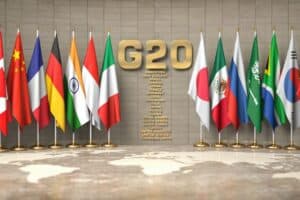But those who risk losing influence won’t give up easily, former finance minister warns.

Deputy president Cyril Ramaphosa could “definitely” turn the South African ship around if he was elected ANC leader at the ruling party’s December conference and became president, former finance minister Pravin Gordhan has argued.
“That is what we must hope for – that the Ramaphosa project does succeed in December,” Gordhan told the Alexander Forbes Investments IFA Symposium.
He warned however that individuals at risk of losing influence within the ANC and in government would not give up the privilege easily, as they would be unable to continue with their “nefarious activities”.
While there might still be efforts to disrupt the ANC conference, it would be best for the conference to continue and for the Ramaphosa team to succeed, he said.
“And then we start the process of moving South Africa back onto the right track.”
Gordhan’s comments follow a turbulent political period in which South Africa’s weak economic growth continued to drift downwards. President Jacob Zuma removed Gordhan as finance minister in March, a move that triggered two ratings agencies to downgrade the country’s foreign credit rating to junk. There has been increasing pressure on Zuma to step down amid reported links to the controversial Gupta family and allegations of state capture. Zuma’s ex-wife Nkosazana Dlamini-Zuma and Ramaphosa are considered to be the front-runners in the ANC leadership battle.
Since December 9 2015 when former finance minister Nhlanhla Nene was dismissed “under false pretenses by the president” politics have messed up the South African economy, Gordhan said.
“2016 and 2017 have been about creating conditions – not for economic growth, not for better prosperity for South African citizens, not for better growth so that you have a better fiscal framework that is going to be tabled on October 25 – conditions that would allow you-know-who to loot from state-owned entities and other entities of the state so that your taxes begin to move in the wrong places and into foreign accounts.”
Gordhan said if this was the focus, the immediate environment was neglected, resulting in lower levels of confidence, investments and growth and in turn lower revenue numbers running into “tens of billions”. In one way or another, this had to have an impact on the deficit and debt numbers in the budget.
“If you have a combination of that and the wrong results in December then I think we are in trouble in 2018 and the ANC itself is in trouble in 2019 if it doesn’t make the right kind of choices as well.”
He said as a loyal member of the ANC, he didn’t believe this was where the party wanted to go.
Asked to comment on reports that corporates weren’t investing and that there was a seemingly acrimonious relationship between policymakers and the business community, Gordhan said corporate risk averseness was a global phenomenon.
He said since Nene was dismissed – particularly during 2016 and the early part of 2017 – a lot of work was done to bring leaders in government, business and labour together which yielded positive results. One of these was the youth employment scheme that would provide jobs for a million young people and that would hopefully be completed soon.
While he didn’t believe the overall relationship between business and government was angry and bitter, he conceded that the relationship was acrimonious in “certain areas”.
“Let’s be frank: The mineral and resources minister [Mosebenzi Zwane] and the mining industry aren’t going to get along because that minister has a particular agenda and that agenda is not constructive for this country.”
With the right collaboration and leadership in both government and business, it is possible to change the mining industry and find a pragmatic way forward, he said.
Asked whether Ramaphosa would change the way the ANC operated and whether he would have enough power to do so, Gordhan said it would be “key objectives” if the deputy president succeeded in December.
“We in the ANC ourselves talk about renewal of the ANC so that it works differently, regains the old values of the Mandela generation and ensures that factors like corruption and factionalism don’t destroy what is a powerful organisation.”
Gordhan dismissed a suggestion that the South African economy could follow in Venezuela’s footsteps and spiral into chaos, saying South Africa’s institutional framework was very different and its civil society was active.
Brought to you by Moneyweb






